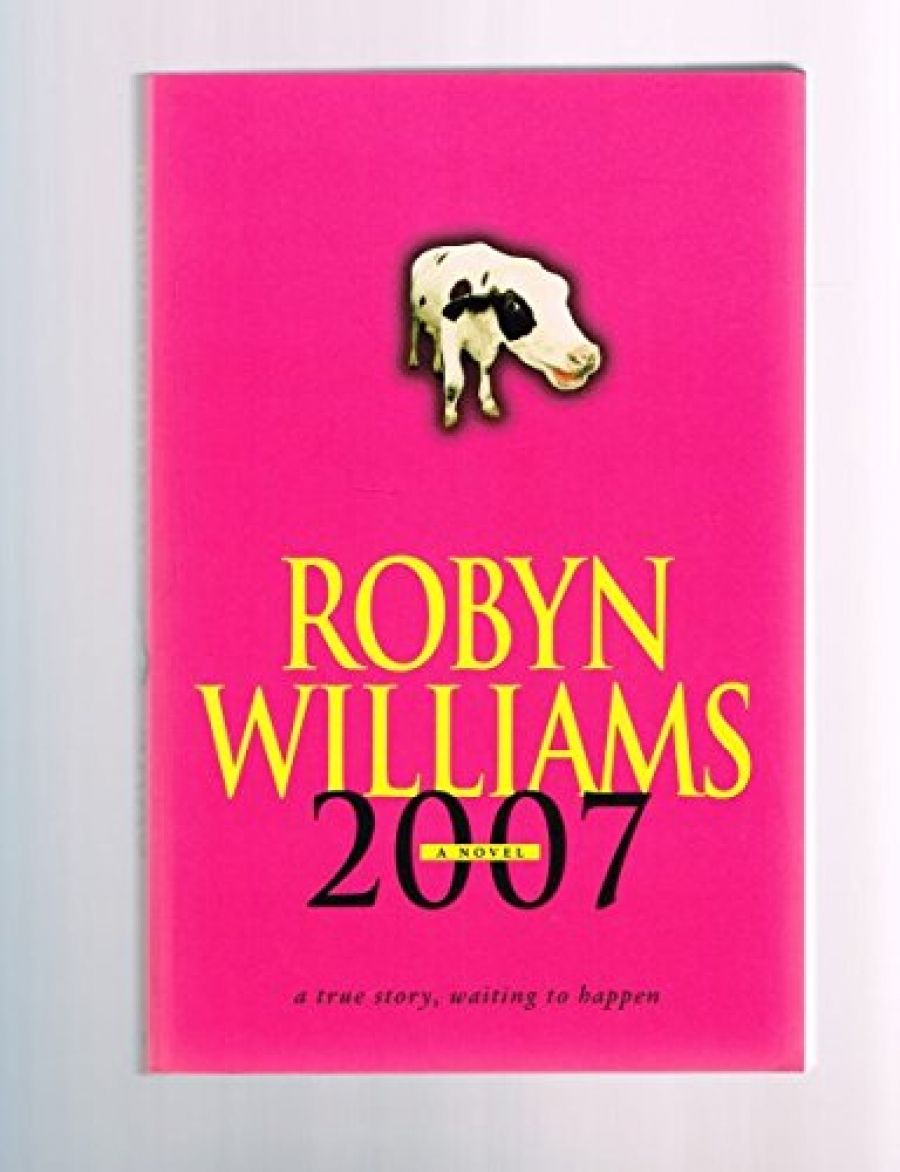
- Free Article: No
- Contents Category: Fiction
- Review Article: Yes
- Article Title: Probing the possibilities
- Online Only: No
- Custom Highlight Text:
Much loved public characters who venture into fiction in their mature years are, of course, on a hiding to nothing. Their apprenticeship, their experiences, their intuitions have all been spent or deployed elsewhere. In the case of Robyn Williams, these were as a distinguished science reporter and analyst for the ABC. The knowledge and opinions that he gathered there have been brought to the making of his pre-apocalyptic first novel, 2007. This is, the cover warns, ‘a true story, waiting to happen’. Williams’s mentor in fiction is George Orwell, who is quoted with approval by a cashiered and bibulous former Cambridge don, Cyril, now exiled to a weather station at Cape Grim in north-western Tasmania (site of the world’s purest air, as it happens). Orwell advocated ‘retaining one’s childhood love’ of the things of the natural world, toads not least. The alternative was ‘hatred and leader worship’.
- Book 1 Title: 2007
- Book 1 Subtitle: A true story, waiting to happen
- Book 1 Biblio: Hodder Headline, $29.95pb, 263pp
Williams’s novel is a serious polemic which finds beast fable and cartoon among its preferred forms of transmission. 2007 begins with a series of catastrophes – the sinking of a whaling ship, the closure of airports around the world among them – for which birds and animals appear to be responsible. What has excited them? What has, more disturbingly, concerted their endeavours? Besides that, the weather patterns of the world are more extreme than usual. ‘Gaia’ seems to be atypically, perhaps even disastrously, annoyed. Maybe the earth’s ecosystem, unable to maintain stability, is about to close itself down, with its non-human creatures in alarmed and alarming collaboration. This is a messier scenario than a speeding asteroid or saucer-loads of Martians, but Williams is bent on probing its possibilities.
He puts in play a cast, some of whom retain more differentiating human characteristics than most of those who are doomed to act in disaster movies. From Cape Grim to Washington travel good-natured Dr Julian Griffin, his daughter Louise, and their dog Jez. No wife and mother: she has been killed during a protest against logging in the old growth forests of the west coast of Tasmania. On the way to world headquarters, too, is the very smart Englishwoman Kate Schumpeter, who works for one of those institutes dedicated to explaining how capitalism must prevail against ‘sanctimonious doom [merchants]’, and ‘over-educated misfits in ... Jesus sandals and stupid rags who campaign for humanity but can’t stand people’.
Like Milton’s Satan, those of the devil’s party get the best lines. The earnest and righteous must nonetheless persevere. Satan this time is former US Senator Hector Breen, nicknamed the Pontiff, who is at the black heart of the kind of conspiracy theory that a novel built on Williams’s premises was bound to uncover. The plan is a faunicide fantasia, ‘to use genetically engineered bugs to wipe all large fauna, all vertebrates apart from us off the face of the earth. Gone. The lot.’
It nearly happens, and it would have done if a Disney-educated animal kingdom had forgotten all those movies in which its denizens could speak out for, and act in determination of, their own destinies. Megalomaniac planners of the future are discomfited. The rowdy and recalcitrant nations of the earth sign up to Julian and Kate’s plan (she has changed teams after the ministering licks of Jez the dog) to cut greenhouse emissions, reduce energy consumption and, of course, save the whale. 2007 does not spare itself a happy ending, for which we can be glad.
For all the preposterousness of its entwining of human and animal wills at the core of the plot, for all the Hollywood advice about never acting on the same set as children or animals, the novel’s human dimension is managed with a surprising and impressive tenderness. The relationship that might have been between Julian and Kate is not allowed to lapse towards the inevitable cliché until after the last page. Louise is smart, not cute; she cares about grammar and reads Dickens. Even the shifty undercover guy Dwane, who falsely proclaimed himself a Rhodes Scholar, veers back towards the American way. A book that has put us through a latter-day children’s Crusade (and that beginning in New York’s Central Park) had better have some quotient of charm and wit. Fortunately, 2007, and Williams, have enough of both.


Comments powered by CComment